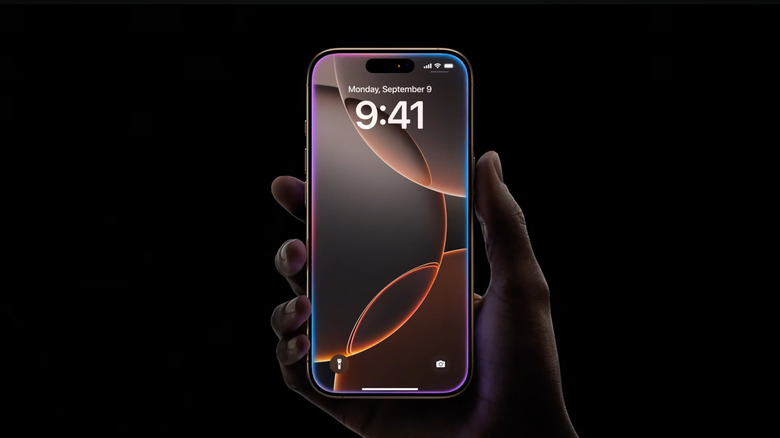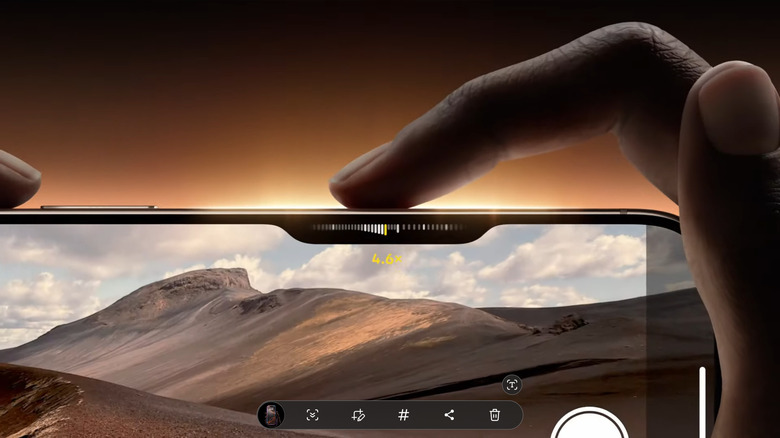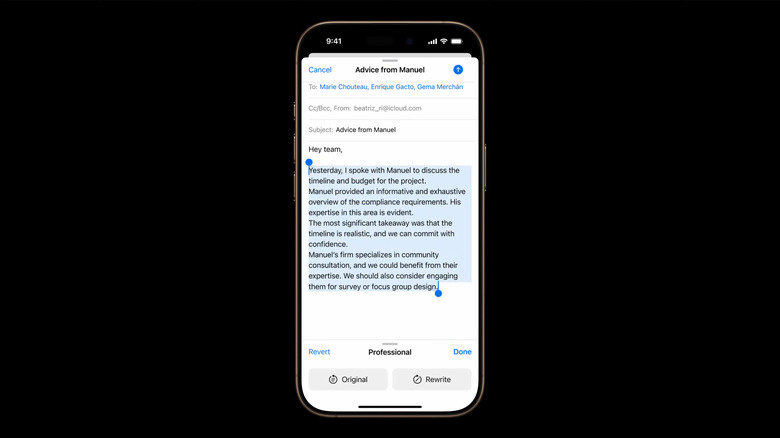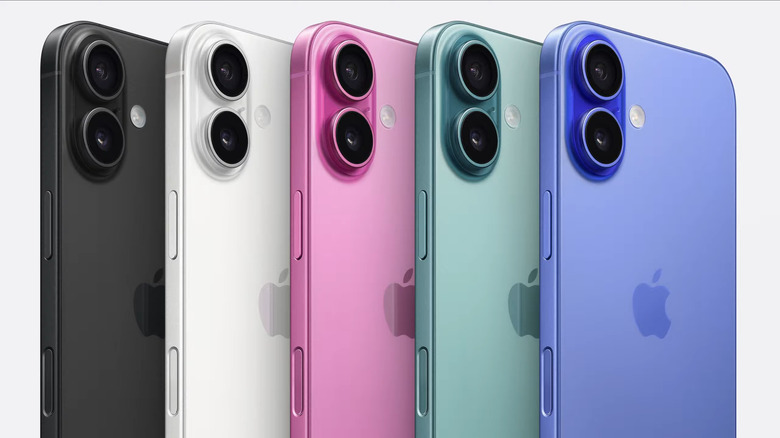The iPhone 16 Is A Smart Rejection Of The Worst Smartphone Trend
When Apple unveiled the brand new iPhone 16 lineup, its representatives had some eyebrow-raising surprises. There are new hardware buttons for camera control and shortcuts that look both useful and fun. There are new iPhone colors, a new A18 chipset, and new camera features. However, what went unsaid during the introductory presentation shocked me most. Although time was devoted to the new AI capacities that the company is collectively calling Apple Intelligence, those features are extremely sparse in comparison to the iPhone's biggest competitors.
Whereas Google and Samsung have packed the latest flagships — the Pixel 9 and Galaxy S24, respectively — to the brim with AI features, Apple's newest phones have far fewer, and honestly, good riddance. While a large proportion of the tech industry has plowed ahead with AI features that are variously useless, broken, or actively harmful, Apple looks to have had the foresight to avoid such mistakes — curating useful AI features into a thoughtful package.
That AI asceticism is most noticeable in the iPhone 16's camera, which has no gimmicky or reality-altering generative features. Those mindful, demure sensibilities filter down through the rest of the device, too. There's a clarity of purpose to Apple's AI, along with an apparent commitment to data privacy that the rest of the industry should strive to copy. As the public is growing tired of supposedly futuristic AI features that don't meaningfully serve them, Apple Intelligence is a breath of fresh air.
The iPhone 16's camera is refreshingly light on AI
One of Google's big pitches for the Pixel 9, was the ability to take photos of things that never happened. The Add Me feature inserts people into photos after they've been taken. Even worse, the Reimagine feature lets users add other objects to images, which reporters have shown can be used to create dangerous misinformation. Samsung has its own range of similar features to add or edit people and objects on the Galaxy S24 series, but Google has been so brazen as to claim in WIRED that these AI features "create the moment that is the way you remember it ... but maybe isn't authentic to a particular millisecond."
The iPhone 16, by contrast, is blessedly devoid of these gimmicky and potentially harmful reality-bending features. Apple Intelligence is there to add insight to the visual the camera captures, such as the breed of a dog or the ratings of a restaurant, while helping users take the best possible photos of what really happened. New additions to the camera, like updated Photographic Styles or the Audio Mix feature that can isolate voices, are powered by "advanced intelligence and machine learning" says Apple, but crucially, they don't alter the fundamental reality. With that said, Apple does let you remove elements from photos, just like Google's Magic Eraser.
The privacy of Apple Intelligence deserves praise
There's a massive differentiating factor to Apple's AI strategy: privacy. In a world where Google gorges itself on Gemini conversations and OpenAI makes ChatGPT sessions a little more open than I'd like, Apple is running many of its AI features on-device, and promising that it won't store or share your data when things do need to be sent to the cloud. The central claim here is that Apple Intelligence will use your data exclusively to fulfill your requests. The company even claims that IP addresses will be obscured and chat histories deleted by OpenAI, when Siri outsources its answers to ChatGPT. Everyone should be wary of privacy claims coming from any tech company, but Apple has stated that independent analysts will have the continuous ability to verify the security and privacy of Apple Intelligence.
It's unclear so far how Apple plans to improve Apple Intelligence without the user data to train on, as other AI companies like Google and OpenAI theorize that with enough data, large language models will become more accurate. However, many would argue that these claims disguise a further erosion of user privacy. Google is transitioning from Google Assistant to Gemini as the default on Android, and Gemini stores conversations by default. ChatGPT also gobbles up every morsel of conversational data fed into it.
Apple's AI repeats a successful strategy
Apple's cautious, user-focused approach to AI is not a new way to operate. It reflects the same approach the company has taken many times before. Often, Apple enters a market or product category well after its competitors, which can seem foolish until you look at how often it's worked out well for the company. There were many mobile music players before the iPod, just as there were many tablets before the iPad, and smart watches before the Apple Watch. Even the original iPhone was by no means the first smartphone. What helped Apple surge to success with each of those products — despite its latecomer status — was a careful, studied approach to product design. Rather than racing to be first to market, Apple learns from the mistakes of its peers, then provides a refined product on its first try.
For so-called artificial intelligence, Apple is recycling that strategy. It has seen the various applications for AI, and is doing what it always does: building its own version that expands on what worked elsewhere and tosses out what didn't. That's why Apple Intelligence includes the ability to rewrite your terrible emails, just like on other smartphones, but it won't include the ability to insert an AI generated bomb into a photo of a subway station like the Pixel 9 can. Does Apple simply have better taste? Or is it that as the market leader for smartphones in the U.S., it cannot afford the bad press that would inevitably follow a malicious actor using an irresponsible AI feature to sow chaos? Or a less tech literate person following fatally incorrect, AI-generated advice? No matter the reason, Apple has given its users the most thoughtful package of AI features yet. Other companies should take notes.



